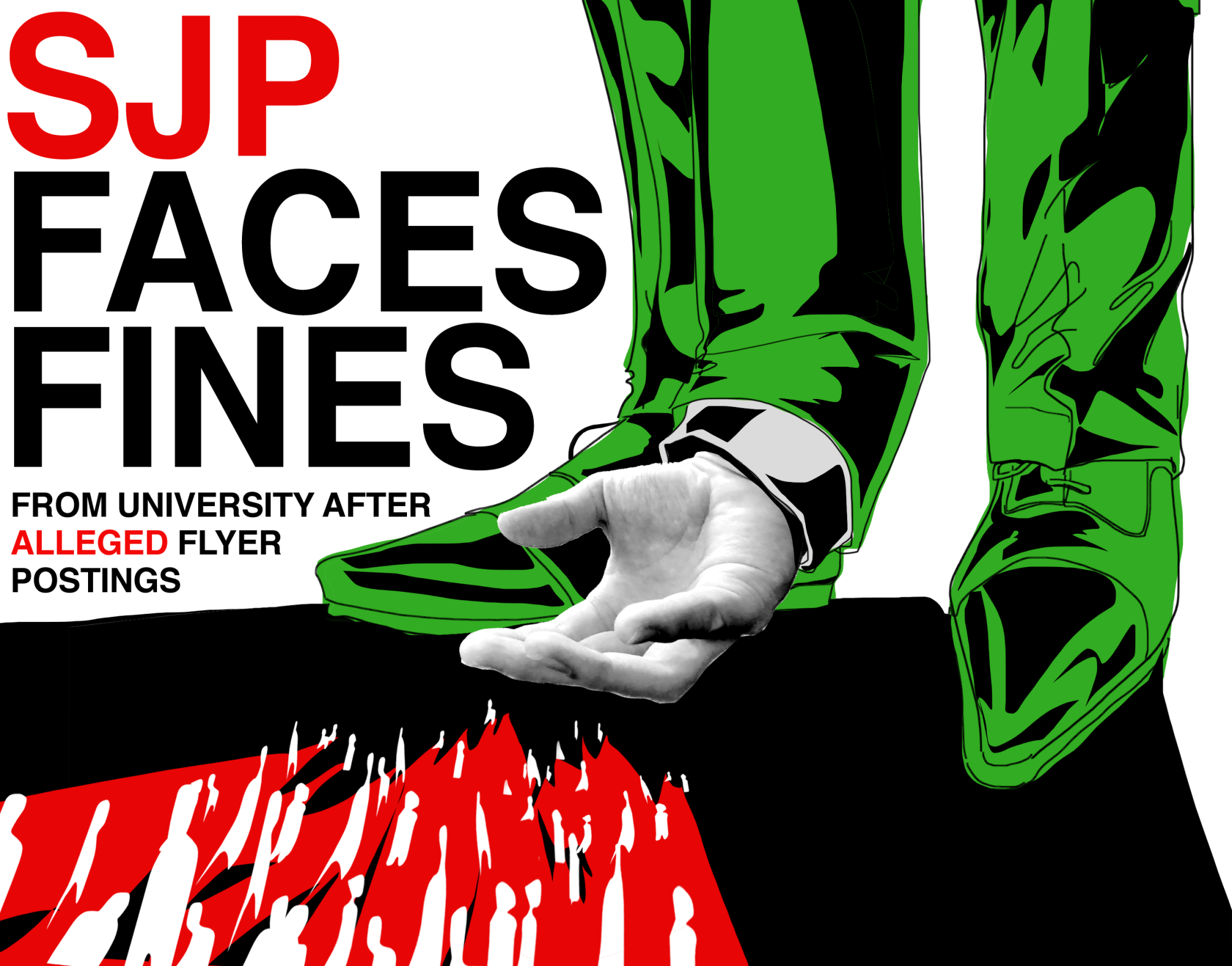It’s been over a month since Case Western Reserve University’s Students for Justice in Palestine (SJP) chapter was suspended by the Office of Student Conduct. At the time, many students were curious about what the administration’s next steps would be. Their curiosity was answered in an April 19 Instagram post when SJP said that CWRU imposed fines on individuals for violating the Posting Policy.
Original reporting on the potential consequences of SJP’s supposed actions came about at the March 5 Undergraduate Student Government (USG) open Executive Meeting. One attendee stated that the administration is “Basically lawyering up against 20-year-olds since last semester thinking that it wouldn’t be reciprocated. SJP does have a lawyer team, but, as college students also in debt, having to use lawyers into this to go against our administration shows that the process isn’t really fair.”
In comments to The Observer, anonymous members of SJP said, “we do have legal counsel that has communicated with the university on our behalf on several different occasions.”
SJP members said, “as a result of the heavy-handed reactions of the university following the protest our club organized on November 6th, 2023 and then beyond. We do however prefer to keep our legal team anonymous at this time at the discretion of our organization but we are immensely grateful for the guidance they have provided us with pro-bono.”
They continued regarding the reasons as to pursuing a legal team was because “We felt like we were being targeted and this is the only way we can ensure our safety was by having a legal team. During meetings, the presence of CWRU’s legal counsel loomed, casting a shadow of authority and legal prowess.”
“These attacks [from the administration] have caused waves of stress and anxiety, especially as students given we were in the midst of our midterms when the suspension was unexpectedly imposed on us,” their members said when asked how these legalistic attacks are being treated.
In response to a question about whether students should expect the Office of Student Conduct to implement stricter enforcement of its Posting Policy as seen with SJP, they responded, “We have been and will continue to be consistent in the application of our policies.”
According to the policy, prohibited areas include “All academic and administrative buildings and restricted surfaces in residential facilities (including windows, doors, columns, classroom chalkboards/Write-On Board, etc.).”
However, many students, both in and outside of SJP, claim the statement is simply untrue. Fourth-year student and organizer of the Divorce Pact Cameron Celebuski gave a presentation about the Posting Policy and previous enforcement of the Posting Policy just after the March 5 USG meeting adjourned.
His presentation argued that SJP did not violate the Posting Policy, and if they did, the university is unfairly targeting SJP by detailing how other student groups have also violated the same posting policy that SJP is accused of while not suffering any consequences. He said, “I just hope they got [the message that] the school was being really hypocritical like starting with SJP, and then none of the other clubs.”
Regarding his presentation, Celebuski said, “everyone seemed really supportive. And I still don’t know what admins think about it. I don’t know if they’ve seen it. Hopefully, they do.”
On April 18, SJP said that the Office of Student Conduct had fined members a total of over $2,600 for the violations of the Posting Policy. They said the fees were distributed based on the amount of students fined, with upwards of 12 months of disciplinary probation also imposed.
SJP said that they are working with the Cleveland Chapter of the Council on American-Islamic Relations, Ohio (CAIR-Ohio) through this process. CAIR-Ohio has not responded to requests for comment.
In SJP’s Instagram post, which has yet to be independently verified by The Observer, they say that the university claims that SJP’s actions have cost the university $2,619.22 in staffing and materials costs. For each individual, they are seeking individuals to pay between one-quarter and one-eleventh of the cost.
When asked to comment, the university said, “Due to the Family Educational Rights and Privacy Act (FERPA), the university doesn’t comment on student conduct issues. For all student organizations, the university follows its student judicial policies and procedures and applies these uniformly and fairly across groups.”
This update was met with outrage; the Instagram post in question received over 20,000 likes.
“I was always proud to be a CWRU grad. Can’t say that anymore!!!” said one comment under the Instagram post. Another simply wrote, “thank god i didn’t apply here.” The Arab American Anti-Discrimination Committee offered to help cover the fines, while other Instagram users asked about a GoFundMe page.
Repercussions for SJP are not unheard of when viewed in the national context.
The University of Southern California recently canceled its valedictorian’s commencement speech citing security issues, which has faced large-scale backlash from students around the nation. Columbia University recently arrested 108 people for creating a protest encampment on their campus, which has resulted in a faculty walkout and worldwide media attention, with reports of a larger community protest that followed.
While the actions of the CWRU administration are not the most drastic in the country, nor are they attracting media attention beyond a few local newspapers, they have had an indelible impact on the CWRU community that will continue to be felt as the Israel-Hamas war persists.




